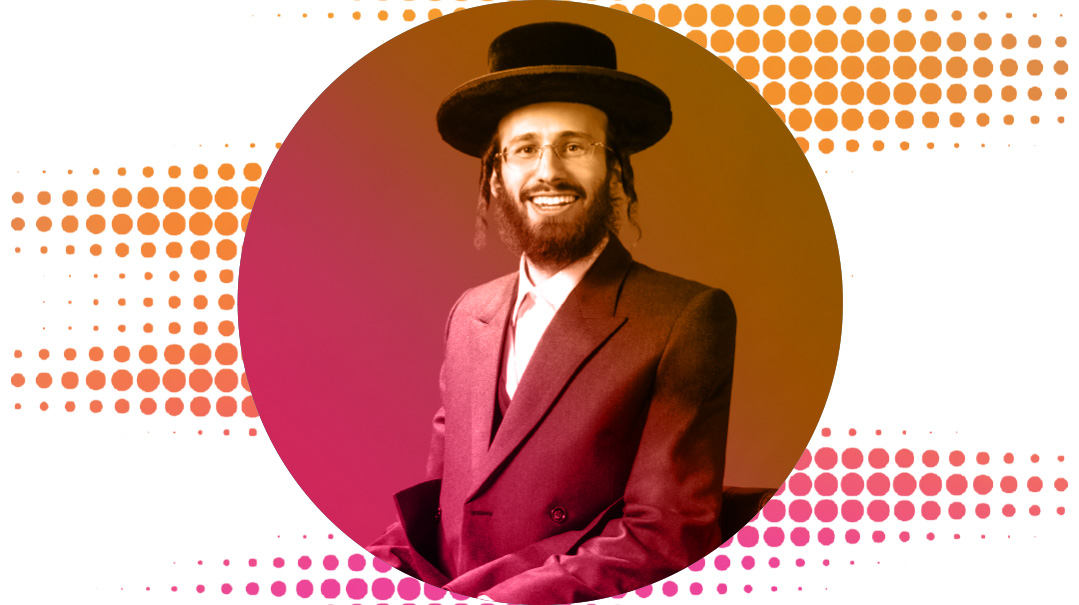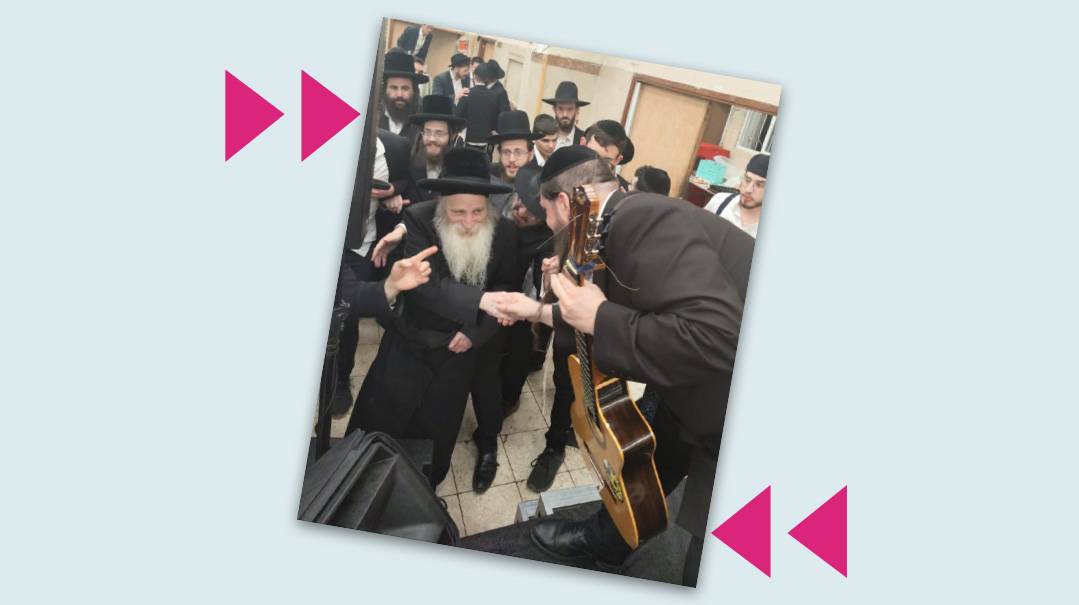Mood Mix with Aba Berkowitz
| May 9, 2023As the owner and conductor of Lev Choir, a New York-based adult choir, he loves helping people actualize their personal musical vision for their special night

I
f there’s anything that makes ABA BERKOWITZ happy, it’s sharing in his clients’ simchahs. As the owner and conductor of Lev Choir, a New York-based adult choir, he loves helping people actualize their personal musical vision for their special night.
A SONG THAT HAS AMAZING, ORIGINAL VOCAL ARRANGEMENTS
While choir vocals used to be viewed as a more integral part of the arrangement, most contemporary arrangers think more about the music when they produce a song. You’ll notice that Mona Rosenblum’s arrangements often include a key role for choir, and Yoeli Dikman is one of the few younger arrangers who also uses a choir creatively as part of his productions. Dudi Kalish is a master of choir arrangements. He produced the choirs for Lipa’s albums, and also produced a set of a cappella albums called Chassidishe Oitzros, in which he uses the voices for counterpoint and answering harmonies with incredible effect. He managed to produce songs in full “color,” with vocals in place of music.
THE MUSIC I MISS DURING SEFIRAH
During the year, I’m too busy to listen to music for pleasure, because I’m constantly learning songs that my clients have requested for their events. I don’t have much time to just sit in my car and listen and relax. It’s ironic that now, during Sefirah, there are obviously far fewer events, and I have the time, but what can you do?
A SONG THAT DOESN’T NEED MUSIC, AND IS EVEN BEST SUNG A CAPPELLA
Some march-style songs can be best delivered by a choir, singing very tight and professionally. Our choir sings “Shir Hamaalos” in a march tune, and we usually tell the musicians to hold off, because it’s nicer and more of a shtick when we just sing it ourselves, 100 percent tight and full of harmonies.
MY LAG B’OMER GO-TO SONG
The slow song “Yeiru’eh,” followed by the words “Viyehi Noam…,” which is sung at the hadlakah of the Boyaner Rebbe in Meron. Actually, I’ve never been there on Lag B’omer itself, but I learned the song when I used to sing at the Boyan bonfire in Boro Park. It’s slow and warm and full of hisorerus.
A SONG I NEVER GET BORED OF
Any song that’s sung for real, in the place and time that defines it. For example, “Kah Echsof” on a Friday night, or “Mi Adir” at a chuppah. We’ve sung “Mi Adir” to the niggun of Moshe Goldman’s “Ani Maamin” hundreds of times, and it doesn’t ever get stale, because it articulates the spirit of the moment perfectly. It also helps when the song is an old niggun with a big neshamah.
MY MOST MEMORABLE EVENT
Hatzolah’s event during Covid, called “United for Protection.” There was a very moving hachnasas sefer Torah, and a lot going on musically. The knowledge that tens of thousands of people around the world were watching live made it feel like a worldwide movement.
AN INSTRUMENT I WISH I PLAYED
Bass guitar. It’s the fundamental core of the music, creating the rhythm and also the mood. Well, maybe drums are the real core, but in a sense, they are not actually music, because there are no notes and no tune, only rhythm. I find bass guitar very expressive, and I hope I’ll get to learn it some day.
A SONG OR SINGER WHO “BROKE THE MOLD”
I’d say Mordy Shapiro has broken the mold. And Lipa has taken many risks in breaking molds and stretching boundaries. One thing about Lipa’s albums is that he is authentic to himself. He doesn’t follow a formula or any rules, but simply expresses himself in the language of music. This has paved the way for some other artists to be more natural as well.
His last album features a song about the seven sons of Chanah. Before its release, I was in Lipa’s house, and he invited me to hear it. I closed my eyes and let the music take me on a journey. The creativity of that track, the way Lipa uses music to create sound which is almost like sound effects, blew me away. It’s a combination of music and emotion that fuses into a kind of musical storytelling experience.
MY FAVORITE FRIDAY NIGHT NIGGUN
At the seudah, I sing some of the zemiros my father sings, but on the way home from shul, I like to sing something to get into the spirit, and that changes from time to time. At the moment it’s Shwekey’s “Bo Shabbos” song, composed by Hershy Weinberger. It has a real Shabbosdig feel.
AN EVENT I GET EXCITED ABOUT
I love events where the host of the simchah knows what he wants, explains which songs he wants us to play to express his simchah and which songs he doesn’t want to hear, and which songs his zeidy enjoys and which he can’t take. Then we know that the music is exactly in place, meaningful to this family and their simchah, and we are really passionate about delivering it 100 percent. If it’s just a “bugaboo vibe,” where they want the same as everyone else, the same wedding as the night before and after, then we don’t know if we’re actually connecting, and it’s hard to get deeply involved in the music.
AN ALBUM THAT TAKES ME TO A DIFFERENT TIME AND PLACE
My father (popular badchan, Shia Berkowitz) sang on an all-star album called Hameshorerim, produced in 1999 by JJ Fried and Yochi Briskman. I still remember what the advertisement looked like, and the music really takes me back to my childhood.
THE PERFORMANCE I’LL NEVER FORGET
I was at the Motzaei Shabbos finale of the Kesher Nafshi Shabbaton, where Reb Hershel Rosenberg shared personal details of his life and a musical presentation of the backstory of the songs on his Tischadeish album. He was joined by top singers that night as he uplifted the crowd with his words and songs. At the end of the evening, when he came to the song “Veheishiv Lev Avos al Banim” [“He will return the hearts of the fathers to the sons, and the hearts of sons to their fathers”], he called up his son Yiddy to sing together with him and Beri Weber, who had encouraged Yiddy to take part, sang together with him. When Yiddy, who had been struggling to find his path, came up on stage, he and his father embraced, and there were tears on every face in the jam-packed hall of the Crowne Plaza. The singers, the choir members, in fact, even the non-Jewish musicians, were emotional on a whole new level. Later, I heard from other fathers how the song encouraged them to open up their hearts to their struggling children
(Originally featured in Mishpacha, Issue 960)
Oops! We could not locate your form.






